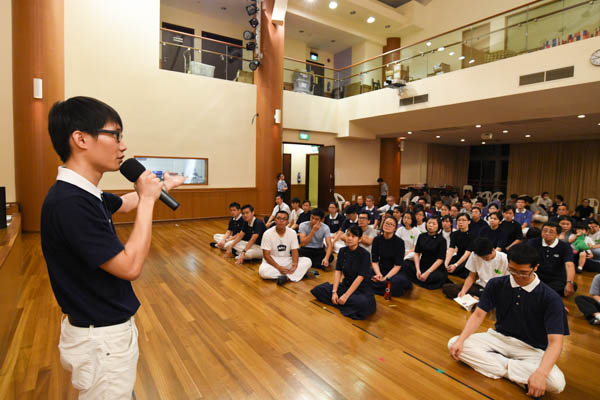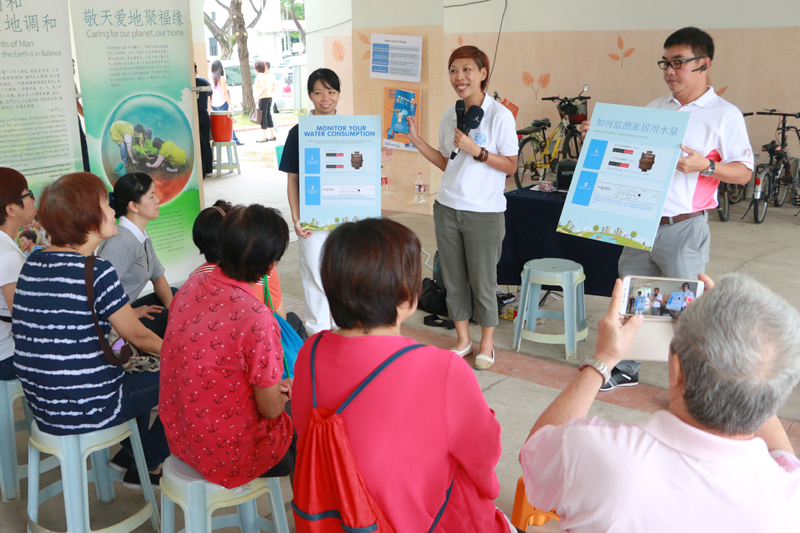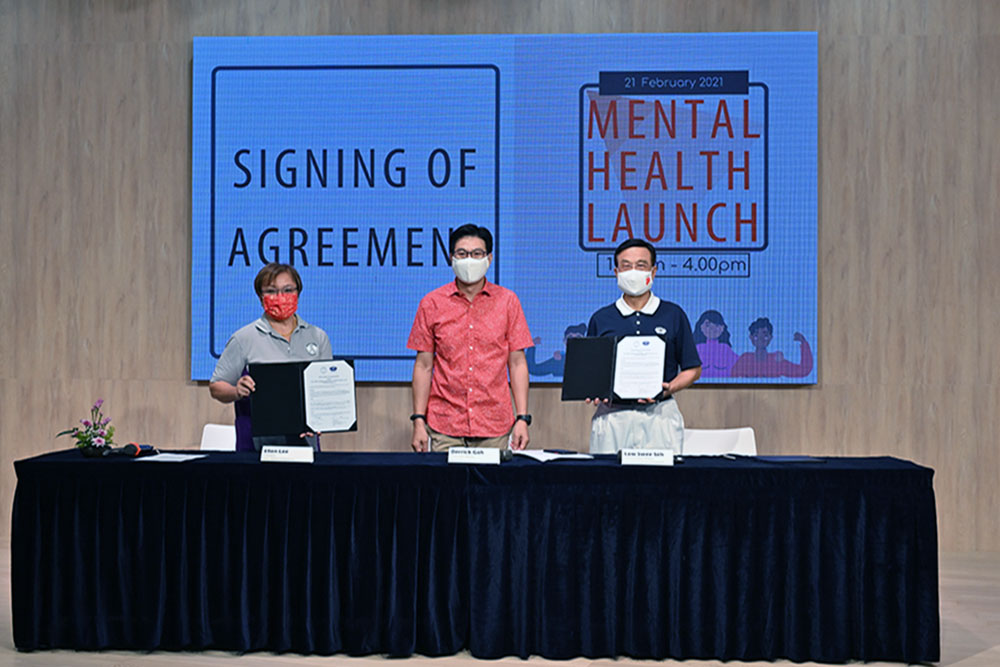
At the water filtration learning station, the children and parents listen to the demonstration by the station master on how to filter lake water using a self-made filter. (Photo: Lai Tong Heng)
Do you drink coffee? After drinking coffee, where do you dispose the coffee residues?
Have you thought of collecting them to make compost? Come to think of it, how much “resources” in daily life do we unknowingly throw away? Besides water and electricity, what other resources has Mother Nature provided us? On 3 June 2012, 110 children from the Parent-Child Bonding Class embarked on an outdoor learning journey with the company of their parents and the Tzu Chi “aunts” and “uncles”.
Situated between Yishun and Sembawang with a land space of 7 hectares, Bottle Tree Park has a simple kampung (village in Malay) inside, and was the destination of the day for these 218 participants from the Tzu Chi Parent-Child Bonding Class.
Ground-Up Initiative (GUI), a volunteer-driven non-profit community, has been shaping a Sustainable Living Kampung in the park since April 2009. The organization takes pride in encouraging projects and challenges that cultivate environmental awareness, a hands-on culture, leadership, personal responsibility and teamwork. Purposely not equipped with water supply, the ‘kampung chief’, Mr Tay Lai Hock hopes that visitors to the kampung will realize in the face of this inconvenience how precious water is and start to treasure this resource.
The kampung, which is usually serene, was bustling with activity when our Parent-Child Bonding Class members arrived. Mr Tay began the hands-on tour by explaining to the group the motto of GUI, which is ‘Connecting People, Connecting Earth. Healing the Land, Healing the Human Spirit.’
“Mother Earth has nurtured and provided us all along but humans today forget to show gratitude. Hopefully this activity can invite more people to love Mother Earth and start doing their part for the environment,” said Mr Tay while stressing the need to always ‘Farm your heart and garden your soul’.
The outdoor event comprises of three learning stations: water filtration, farming and composting stations. Within three hours, the children were divided into groups to learn and get closer to nature.
At the water filtration station, the materials given to the children and their parents were PET bottle, cloth, charcoal, sand and stones - but in what order should these be stacked up inside the bottle to be able to filter lake water effectively?
The children observed closely and repeatedly experimented with the materials, and with guidance from their parents, they slowly grasped the idea behind the process of water filtration.
While comparing results, Huang Yong Xiang and Huang Yong Bin’s self-made water filter stood out from the crowd. The lake water turned clear with just one round of filtration, wowing the rest of the group. The brothers shared that they are very interested in science and love to read science-related books. The two curious minds even intended to read up more on the filtration process afterwards to carry out the experiment once more at home.
The station master explained that even though the filtered water does not meet the hygiene standards, in poorer countries such as India, some people do use this method to obtain drinking water.
“Their water is very clean!” Upon hearing praises from others about their filtered water, Liu Hui En and her dad Liu Jun Hao felt really accomplished. Putting aside his duties as a doctor that day, Dr Liu truly relished in the rare opportunity to let her girl learn about conserving Earth’s resources. Hui En, on the other hand, felt fortunate that she lives in a country with access to clean drinking water and vowed to “treasure and not waste water from now on”.
Upon arrival at the farming station, station master Guo Jun Xiong patiently explained the functions of each farming tool and taught the children how to use them safely. He also introduced them to grains such as barley and soy. Soon, the children and parents started using their hoes, shovels and rakes to try loosening the earth and planting soy. As excited as they may be, they also found out that farming and weeding under the hot sun was not as simple as they thought!
“This is why we should be grateful for our food.” Mr Guo, who gave up a high-paying job a year and a half ago to serve in the village, noted.
“We are here today not only to work on the land, but also to work on our hearts. In order to have solid foundations, one must dig deep. One must have a big heart, and be accommodating. Just like the earth must be loosened for seed planting, we should also open our minds to open up to more possibilities in life.”
In fact, it was the first time for many to see real barley sprouts that day, and the children were interested to learn to differentiate between weeds and sprouts. No wonder little Chen Qiu En was coaxing her dad to bring her back weeks later to check on the growth of the soy she planted.
Master Cheng Yen used to say, “An item’s true value lies in how often you use it.”
Indeed, the lifespan of things are short if you throw them away. If you reuse them, you can create a longer life for them. So how can we further utilize things in our daily life, such as coffee residues?
The composting station engages participants in experiencing using materials such as kitchen scraps, leaves and sediments to make fertilizers. First, vegetable stems, peels and fallen leaves were cut into pieces. Next, charcoal, fallen leaves and kitchen scraps were added in sequence into a can, which is later covered with sand and soil. After that, it is left in a cool place to ferment for three months.The station master reminded the children to open the can lid everyday for five minutes to allow it to “breathe”, and in three months’ time the natural fertilizer will be ready!
Before the end of the day, it drizzled in the village, providing the group some relief from the heat. With the help of parents and volunteers, the event managed to raise some money for GUI. The volunteers also presented the GUI staff with gifts and wish them success in their vision to promote environmental education.
Holding on to her self-made water filter, Little Zheng Lian Xin happily announced that water filtration was her favourite lesson of the day.
It turns out that she also regularly accompanies her mother to recycling events, and even knows how to sort out paper materials.
Children learn best when they get close to nature. This time, the event was held outdoors and the three learning stations at the Sustainable Living Kampung provided the children a fun experience, allowing them to better appreciate how precious Earth’s resources are.
Thank you, our GUI friends!

110 children from the Parent-Child Bonding Class embarked on an outdoor learning journey to explore nature at Bottle Tree Park in the company of their parents and the Tzu Chi aunts and uncles. (Photo: Lai Tong Heng)

‘Kampung chief’ Mr Tay Lai Hock explained the motto of Ground-Up Initiative to the visitors. (Photo: Lai Tong Heng)

The children observed closely and repeatedly experimented with the materials at the water filtration station. (Photo: Saw Gwek Keow)

Upon arrival at the farming station, station master Guo Jun Xiong patiently explained the functions of each farming tool and taught the children how to use them. (Photo: Saw Gwek Keow)

The children excitedly started using their hoes, shovels and rakes to farm and weed. Doing it under the hot sun, they found out that it was not as simple as they thought. (Photo: Lai Tong Heng)

The composting station allowed participants to experience using materials such as kitchen scraps, leaves and sediments to make fertilizers. (Photo: Lai Tong Heng)



